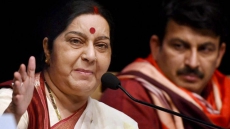Controversial pacer S. Sreesanth has hinted that he may opt to play for another country if the Board of Control for Cricket in India (BCCI) does not remove the lifetime ban imposed on him over allegations of spot fixing.
"BCCI has imposed the ban, not ICC. If not India, I can play for any other country, because am 34 now and I can only play for maximum six more years. As a person who loves cricket, I want to play cricket. And not only that, BCCI is a private firm; it is only us who say that this is the Indian team, but you know BCCI is a private body after all," Sreesanth told Asianet News.
"So, if I play for any other country, it probably may be the same. Yes, representing Kerala in Ranji Trophy is different. I had hoped to win Ranji Trophy, Irani for Kerala, but the decision rests up on the BCCI," he added.
Sreesanth was caught up in a controversy over betting and spot fixing in the Indian Preemier League (IPL) along with his Rajasthan Royals teammates Ankit Chavan and Ajith Chandila in 2013. He even had to spend time in Delhi's Tihar jail over the issue later that year.
The BCCI Disciplinary Committee headed by present Union Finance Minister Arun Jaitley had slapped a life ban on Sreesanth.
On account of the life ban, the pacer cannot play even league cricket nor get access even for practice to any of the cricket grounds where the BCCI or the state cricket associations have a stake.
In 2015, the pacer along with Chandila and Chavan players was exonerated by the Delhi court in the case registered by the Delhi Police which invoked the Maharashtra Control of Organised Crime Act (MCOCA).
After Sreesanth approached the Kerala High Court in March this year with a petition seeking the lifting of the ban imposed by the BCCI, following a Delhi court exonerating him in the spot-fixing case, the court asked him to file a review petition before the BCCI.
Kerala High Court subsequently lifted the life ban on August 7.
The BCCI decided to appeal that verdict following which a division bench of the Kerala High Court reinstated the life ban on October 17.





